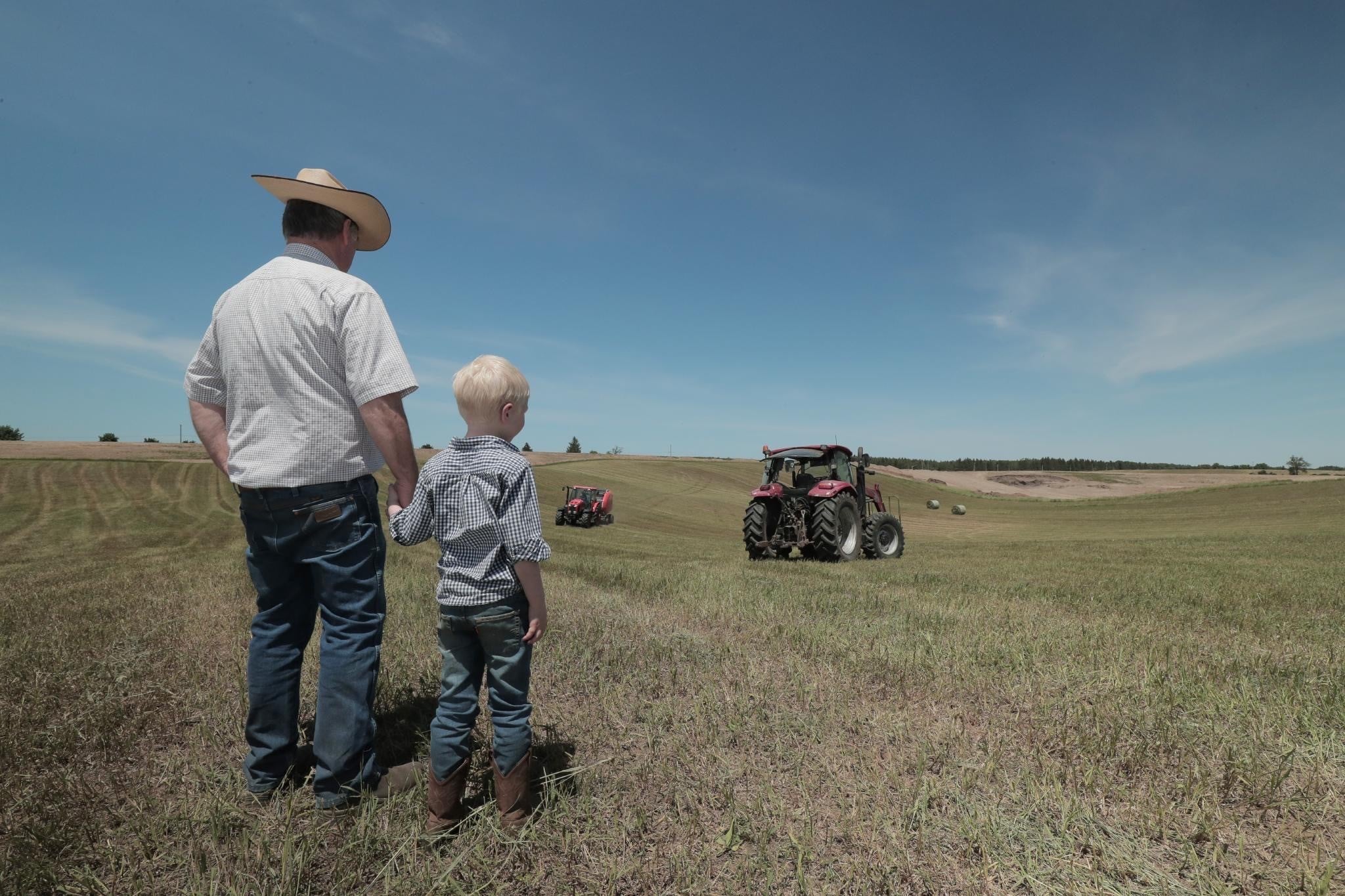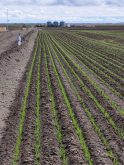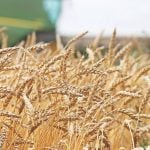Jolene Brown was looking directly at the panel of three who had just lost their farming spouses. Then she asked the question. “If you had one more day, what would you say, what would you ask and, what would you do?”
Brown knew it was a tough question. She’s a popular speaker, farm business adviser and farmer from West Branch, Iowa, and she was ready for the panel to hesitate and to maybe need some sympathetic coaxing before opening up, especially in front of an audience. But the answer came fast and clear.
Read Also

Where convention and innovation meet
How one Ontario farm is integrating technology into their beef operation.
“When my husband died, I was so mad at him,” one of the panellists said. “He left me and this farm in a real mess. And I was so mad at myself because I never asked the questions.”
The desperate memories that echoed in her voice shook Brown so much, she immediately started work on a list of questions of her own. Then she grilled her husband with them, and now shares them with her audiences.
When a spouse dies on a farm, the family is left to deal not only with the loss of a loved one, but also with the loss of a co-worker and key decision maker. The work and the responsibilities don’t go away just because someone isn’t there anymore to take care of them. Animals need to be looked after and crops need to be seeded and harvested.
Although everyone grieves, farm families face the extra burdens that tie us to our farms and that govern our financial well-being.
If your parents, sibling, spouse or partner were to suddenly die, what would you need to know? It’s a terrible question, but it’s better answered ahead than leaving your family barraged by unknowns.
“The best thing you can give your family is time,” says Jim Snyder, BDO Dunwoody’s national director of agricultural practice development. With some sharing of information and planning, families can avoid being forced into quick decisions while they’re still grieving.
Like many organizations, BDO has created a list of documents and information your family will need to know the location of if you die. Most such lists are centred around non-farm personal and estate questions and are available online.
“This is an opportunity to show that you love and care for each other,” says Elaine Froese, a farmer from Boissevan, Man. who works as succession coach, writer and speaker.
“The average age of widows in Canada is 56,” says Froese. “We all have expiry dates, we just don’t know when.”
For farmers, the stakes are higher. The capital intensity of our businesses means there’s usually a pile of accumulated assets pulled down by the weight of the family farm tradition. Add in the continual responsibilities for livestock and a limited cropping season, and planning becomes more complicated.
QUESTION #1
Where’s the will?
“Start somewhere, and get a basic will done,” says Froese. “Something is far better than nothing.”
When Froese electronically polls her audiences of farmers, (sort of like how they do it on “Who Wants to be a Millionaire?”) an astounding 20 to 36 per cent say they don’t have wills.
It’s often the having to choose guardians for children or executors for the estate that stops us from getting a will done or updated. For others, there’s the superstition that talking about death will tempt fate.
But for many it’s just another job to do in an endless list.
One thing you might not be aware of is that if you subsequently get married or live with a person, it nullifies a previously made will.
All it takes is a couple of meetings with a lawyer’s assistant and few hundred dollars. For most families, joint ownership and beneficiary designation, combined with a simple will, can do the job. Property such as bank accounts can easily be placed in joint title to pass to the survivor automatically.
You might want to include or reassign the power of attorney which allows a selected person access to assets and bank accounts in case you’re alive but are mentally incapacitated. “Should that person be the farming son or daughter?” asks Froese.
Also, a preferred health-care document, commonly (but not legally) called a living will, assigns a person to make health-care decisions on your behalf when you no longer can. It’s handled and called differently in every province.
Putting your wishes down on paper can take the pressure off family members to make difficult decisions regarding your care, like whether or not to pull the plug.
If there’s no will, the estate goes to probate and the province and lawyers control the farm assets. Probate is the court proceeding through which a will is proved to be valid and the property of the deceased is administered, including collecting the assets, distributing property to heirs, and paying their bills and taxes.
When probate happens the sucking sound of the lawyers and government at the trough can be almost deafening.
Your estate is deemed sold on the day you die and is taxed as income all in one year, including whatever you earned so far that year. Additionally, if the capital property is depreciable, such as buildings and equipment, depreciation claimed in prior years is also added as income in the final return. Also, the balances in registered retirement savings plans, tax-free savings accounts and registered retirement income funds are considered income for that year.
For most farmers, selling all your assets in one year puts you into the 40 per cent income tax bracket, with an extra 10 per cent of the estate going to probate and estate fees. With some proactive planning, many of these problems and costs can be avoided.
“The most irresponsible thing you can do is to die without a will,” says Snyder. “Farm families have a unique rollover and tax provision not available to anyone else.”
Farmers can defer taxes by transferring properties to a spouse or spousal trust, and qualified farm property can be transferred to a child. In both situations, the tax is deferred until a sale of the property or the death of the spouse or child, whichever comes first.
A simple list given to the executor of how personal property should be divided up can also stop a lot of the quarrelling. Who gets what family heirlooms, such as art or antiques, or does everything get sold at an auction?
It’s not always the size of the estate that causes the problems. “Sometimes it doesn’t matter how much an estate is worth,” says Snyder. “It seems more problems arise if there are more resources available to launch an action.”
QUESTION #2
Where did they hide the paperwork?
Surviving family members need to know the location of more than just the will. There are personal documents, such as birth, marriage and adoption certificates, social insurance number card and passport and any prenuptial agreements, divorce and separation agreements.
There’s also the question of where the paperwork for off-farm investments like RRSPs, bank accounts, deeds, mortgages and leases is stored. Is there a safety deposit box? If so, where is the key or combination?
For the farm, more than one person should know where the old tax returns, financial and business agreements and employment contracts are kept. Also, you should share where the business structure documents such as corporation bylaws, stock certificates, buy-sell agreement, and corporation minutes are filed. Where are the vehicle and land titles, along with any lease agreements?
It can be costly and frustrating trying to find this information digging through a shoe box in the back seat of the pickup truck, says Snyder. Not having these documents can lead to a lot of problems.
QUESTION #3
What is your secret password?
Although pin numbers and passwords are supposed to be secret, it’s best to share the farm’s passwords with someone you trust. From instant teller cards and credit cards to online banking, imagine the hassle and holdups if the only person who can make them work is suddenly not available.
Additionally, if only one person knows how to keep the books, you’re inviting a problem. Multiple people do not have to enter the data, pay the bills or make deposits, but it’s critical that at least one other person understand the process. This includes knowing where the chequebooks are kept and ensuring the backup person has signing authority on the farm accounts.
Is the farm’s trading accountant under one name, and who do you deal with? Someone else should know where all those order slips are kept. Imagine if the farm had bought calls and the people left didn’t know it.
Similarly, someone else should be aware of approximately when and how much property taxes and current loans are due. Write down your credit card numbers and estimate when the monthly payments are made.
QUESTION #4
Who could step in?
“Death can put a business on hold,” says Snyder. He remembers a 41-year-old farming client who died without a will. Not only was the family mourning, the farm was out a key employee and was unable to grow until the estate was settled.
Make sure you are replaceable, especially if you are caring for livestock. Technology has given us efficiency but not everyone can easily step into those roles today. It might take some cross-training and written standard operating procedures. (Stop rolling your eyes! It can be as simple as posting directions for feeding, or showing someone else where the keys are kept.)
Knowing where to find interim help may give the surviving family some time to sort out the bigger decisions. For example, dairy farmers should leave a list of milk relief workers and telephone numbers, suggests Froese. “Also, write down the cellphone numbers of some trusted neighbours.
“Be specific in asking for what you need — time, date and place,” Froses says. “Same when you’re offering help.”
Add on to the list the contact numbers for who services the farm and home. Who are your plumber, electrician and feed salesman, and who services the water softener, air/heating, septic and security systems?
QUESTION #5
Where do you go for advice?
Knowing and trusting your farm’s team of professionals is crucial during transitions — and death is one big transition. Froese suggests all partners meet the farm’s professional team, including the financial adviser, lawyer, accountant, banker, broker or insurance agents.
“Start a trust relationship with your advisers before you need them,” says Froese. “Decreasing uncertainty decreases stress.”
Write down their contact numbers and discuss them with your children or spouse. Is there an extension specialist, business adviser or friend to trust with a very fragile situation? Some family members are known for their ability to support each other in tough times and others give out scoops of advice, some even misguided or unwanted.
If renting out the land is the best option, talk about who would possibly rent it, and if there’s an unbiased person who could help with the decision. If selling is a better choice, come up with a person you could trust to help with the process, and think about who would know the best ways to avoid paying too much tax.
QUESTION #6
What do you want for a funeral?
Back at her Iowa farm, Jolene Brown applied the lessons she learned from her widow panel to her own situation. On a long drive with her husband, she brought along a pad of paper and asked him the first of many important questions. What do you want done with your body when you’re dead? (For the rest of her questions go to www.jolenebrown.com
and click on the article with this title.)
On the return trip home, she drove and her husband asked the questions and wrote down her answers. The next day she typed their responses, made copies and gave copies to their kids.
You may also want to do more reading. How-to books and websites about surviving after your spouse dies often have a checklist. Some even go into emotionally rebuilding your life after your spouse dies. One Froese keeps on hand to give to people she knows who have just lost a spouse is called Widow to Widow by Genevieve Davis Ginsburg.
Some folks will want to get right into planning the details of the service and obituary. While on the topic, ask about cemetery plots, suggests Brown. If organs are to be donated, don’t forget to sign the card.
Says Brown: “If we want to honour our loved ones and allow them to remember, we must do the work so they have good memories.”CG














